Gina Holmes's Blog
September 19, 2017
You Would Resent Having Overnight Success
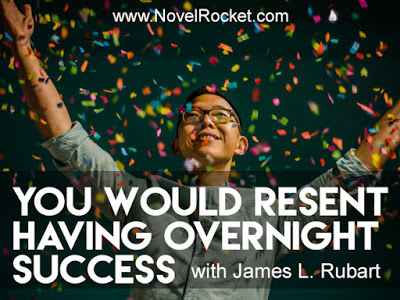 by James L. Rubart, @jameslrubart
by James L. Rubart, @jameslrubartIt’s true.
Even though you don’t entirely believe it. Neither did I.
When I went to my first writing conference back in 2006, I wanted the agent I submitted the first 10 pages of my manuscript to, to email me before I even got to the conference and say, “Oh, wow! You must send the rest! Now! Now!”
(Truth be told, in my deluded, uneducated state of mind, a small part of me expected that to happen.)
What I Needed, What you Might Need as Well
I needed more refinement, more training on craft, an education on how the publishing industry works. I needed to make connections, and work on my craft, build relationships, research agents and publishing houses. Did I mention working on my craft?
That’s the area I believe most writers need to work on more than any other. I’ve seen so many writers who think their manuscripts are pinging along in the 98 percent ready stage, when the reality is more like 80 percent.
But that’s okay. If you were to succeed right out of the gate ... if you didn’t need to learn the things I mentioned above ... you wouldn’t appreciate it when you got there.
Lottery Winners and Radio Stations
Why do the majority of lottery winners lose all their millions in a short amount of time? They tend to come from lower economic backgrounds where they believe success can happen overnight, so they ignore the odds and buy a ticket. But they haven’t put in the time to learn sound financial management skills. They’re not ready for the millions.
When I worked in radio, we’d sometimes give away tickets to our listeners for free, sometimes we’d charge a small amount. When we charged for the tickets? About 85 percent of the people would show up. Free tickets? Thirty percent showed up.
Skin in the Game Makes you Care
Whether it’s paying a small amount for a ticket, or working for money instead of it being handed through a lottery ticket, or putting in years of working on our craft and marketing and networking ... putting out blood, sweat, and buckets of tears makes us care. Makes us appreciate what we’ve accomplished. Makes us honor what God has entrusted us with.
There’s something deep inside us that ends up holding worthless—even resenting--something we don’t feel we’ve earned.
I know this journey is treacherous and the mountain we’re climbing is full of storms. But we’ll always feel a hecka of a lot better standing on top of K2, than we will standing on Blueberry Hill.
TWEETABLES
You Would Resent Having Overnight Success by @jameslrubart on @NovelRocket #writing http://bit.ly/2juaQkO
Putting out blood, sweat, and buckets of tears makes us care. @jameslrubart on @NovelRocket #writing http://bit.ly/2juaQkO
We’ll always feel better standing on top of K2, than on Blueberry Hill. @jameslrubart on @NovelRocket #writing http://bit.ly/2juaQkO
____________________
The Long Journey to Jake Palmer
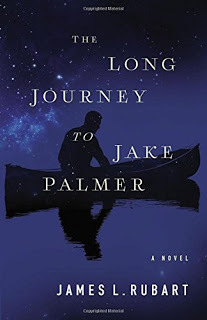
What if there was a place where everything wrong in your life could be fixed?
Corporate trainer Jake Palmer coaches people to see deeper into themselves—yet he barely knows himself anymore. Recently divorced and weary of the business life, Jake reluctantly agrees to a lake-house vacation with friends, hoping to escape for ten days.
When he arrives, Jake hears the legend of Willow Lake—about a lost corridor that leads to a place where one’s deepest longings will be fulfilled.
Jake scoffs at the idea, but can’t shake a sliver of hope that the corridor is real. And when he meets a man who mutters cryptic speculations about the corridor, Jake is determined to find the path, find himself, and fix his crumbling life.
But the journey will become more treacherous with each step Jake takes.
 James L. Rubart is 28 years old, but lives trapped inside an older man's body. He thinks he's still young enough to water ski like a madman and dirt bike with his two grown sons, and loves to send readers on journeys they'll remember months after they finish one of his stories. He's the best-selling, Christy BOOK of the YEAR, INSPY, CAROL and RT Book Reviews award winning author of eight novels as well as a professional speaker, co-host of the Novel Marketing podcast, and co-founder of the Rubart Writing Academy. During the day he runs his branding and marketing company which helps businesses, authors, and publishers make more coin of the realm. He lives with his amazing wife on a small lake in eastern Washington. More at www.jameslrubart.com
James L. Rubart is 28 years old, but lives trapped inside an older man's body. He thinks he's still young enough to water ski like a madman and dirt bike with his two grown sons, and loves to send readers on journeys they'll remember months after they finish one of his stories. He's the best-selling, Christy BOOK of the YEAR, INSPY, CAROL and RT Book Reviews award winning author of eight novels as well as a professional speaker, co-host of the Novel Marketing podcast, and co-founder of the Rubart Writing Academy. During the day he runs his branding and marketing company which helps businesses, authors, and publishers make more coin of the realm. He lives with his amazing wife on a small lake in eastern Washington. More at www.jameslrubart.com

Published on September 19, 2017 02:00
September 18, 2017
The Secret to Powerful Stories
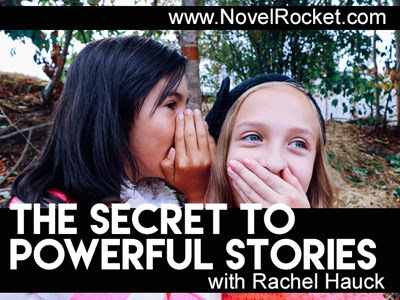 by Rachel Hauck, @RachelHauck
by Rachel Hauck, @RachelHauck This secret will change the way you craft stories. I’m not kidding. What I’m about to tell you will impact your writing all the way to the core and maybe even get you published.
I’ve been judging a contest. I feel like I could cut and paste the same comments in each one.
What does the hero/heroine want?What is the story question?What journey are they going on?Author’s inciting incident has nothing to do with the opening scene.What is his/her fears? Desire? Give a hint of these in the opening.What is the dark moment from her past?Show some sort of competence. Meaning, a superpower (what he/she does well.) Good at his/her job.Show confidence in the midst of failings and weaknesses.What is the black moment?What can the hero/heroine do at the end they can’t do in the beginning?
But all these things boil down to two big questions:
What is the story ABOUT?
What is the moral of the story? (What truth does your character learn?) I was recently reading a budding author’s work where the heroine is called upon for a dangerous task. But there was no leading up to how this would impact her own life. Sure, it’s challenging and exciting to be on a dangerous adventure, but at the end of the day, all of that is just busyness if it doesn’t bring about change in the protagonist.
The author’s writing was fine. She knew how to show and not tell. She employed good pacing. An even balance of dialog and prose. I didn’t agree with some of the character’s motivations but the author used motivation to justify the events on the page.
However, even after two chapters, I still didn’t know what the protagonist wanted. There was no HINT at what her epiphany might be at the end of the book.
Thus, I didn’t care about her as much as I could have.
Even for a simple romance, the story must be about something. A life lesson. A moral. A spiritual truth.
Yes, the story on the surface in about falling in love, but really it’s about coming to some life understand. An epiphany.
In the movie, The Proposal, Margaret fell in love with Drew but only after they both fought through their fears, lies and hang ups. That’s what the movie was about. Coming to some truth that changed them.
The same principle applies to suspense or thrillers. The story isn’t about how John McClane stops a bunch of terrorist. It’s about realizing what’s important in life. His wife. His family.
The conflict of the story is how coming to truth through the book’s events, also known as the plot, bring light and life to the protagonists. This becomes the moral of the story – as seen through the characters.
Answering the questions posed here also deepens your connection with the characters. The dialog becomes about more than conversation to get the characters from point A to point B. It becomes about telling the story. About the little reveals of the characters inner self.
Remember: All stories are about people. Go through your story and see if by the end of the first chapter, there isn’t some hint at what the protagonist wants. A hint of a want or fear.
Note: I’ve seen books that hint at the want and fear, but alas, it they nothing to do with the story. If the protagonist wants to be a big time lawyer, and gets fired from his job, but the story is about him rescuing his kidnapped kid, then what he wants in the story is to be a good father, not a good lawyer.
Simple questions create powerful stories. What does your character want? Why? What stands in His/Her way? What Truth will your character learn? What is the moral of your story?
Keep it simple, that’s the secret.
TWEETABLES
The Secret to Powerful Stories @RachelHauck on @NovelRocket #writing http://bit.ly/2ftHZsz
The story must be about something. A life lesson. A moral. A spiritual truth. @RachelHauck on @NovelRocket #writing http://bit.ly/2ftHZsz
Simple questions create powerful stories. @RachelHauck on @NovelRocket #writing http://bit.ly/2ftHZsz
____________________
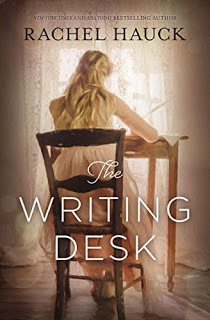 THE WRITING DESK
THE WRITING DESKTenley Roth’s first book was a runaway bestseller. Now that her second book is due, she’s locked in fear. Can she repeat her earlier success or is she a fraud who has run out of inspiration?
With pressure mounting from her publisher, Tenley is weighted with writer’s block. But when her estranged mother calls asking Tenley to help her through chemotherapy, she packs up for Florida where she meets handsome furniture designer Jonas Sullivan and discovers the story her heart’s been missing.
A century earlier, another woman wrote at the same desk with hopes and fears of her own. Born during the Gilded Age, Birdie Shehorn is the daughter of the old money Knickerbockers. Under the strict control of her mother, her every move is decided ahead of time, even whom she’ll marry. But Birdie has dreams she doesn’t know how to realize. She wants to tell stories, write novels, make an impact on the world. When she discovers her mother has taken extreme measures to manipulate her future, she must choose between submission and security or forging a brand new way all on her own.
Tenley and Birdie are from two very different worlds, but fate has bound them together in a way time cannot erase.
 New York Times, USA Today and Wall Street Journal best-selling, award-winning author Rachel Hauck loves a great story. She serves on the Executive Board for American Christian Fiction Writers. She is a past ACFW mentor of the year. A worship leader and Buckeye football fan, Rachel lives in Florida with her husband and ornery cat, Hepzibah. Read more about Rachel at www.rachelhauck.com.
New York Times, USA Today and Wall Street Journal best-selling, award-winning author Rachel Hauck loves a great story. She serves on the Executive Board for American Christian Fiction Writers. She is a past ACFW mentor of the year. A worship leader and Buckeye football fan, Rachel lives in Florida with her husband and ornery cat, Hepzibah. Read more about Rachel at www.rachelhauck.com.

Published on September 18, 2017 02:00
September 17, 2017
Nature or Nurture?
 by Marcia Lee Laycock, @MarciaLaycock
by Marcia Lee Laycock, @MarciaLaycockI recently put my maiden name into one of those “learn about your ancestry” sites and this is what it said –
Lee: Irish: reduced Americanized form of Ó Laoidhigh ‘descendant of Laoidheach’, a personal name derived from laoidh ‘poem’, ‘song’ (originally a by name for a poet).
That was not a surprise. I knew I had descended from a long line of storytellers. I spent enough time around my Grandfather, not to mention my father and five uncles, to know the truth of it. They were a raucous bunch prone to argue and sometimes fight, but when one of them started telling a story the room would go quiet with respect. Of course, when he was done, they’d all say he was “full of the blarney,” but that was taken as a compliment received with a smile of pride.
When I read where the name Lee came from, it made me think about that old debate – is it nurture or nature?
I can’t remember a time when I didn’t write. My mother often said I was born with a pencil in my hand. I can’t imagine my life without writing. It’s simply part of me, yes, part of my nature.
But I also wonder where I would be now without all the nurture I’ve had along the way. My parents encouraged me to keep that pencil in my hand. My teachers too, from grade school to university, nudged me to keep doing it and taught me a lot about what good writing looked like. Then I had the privilege of attending writing conferences where I learned from those who were further along than I in this journey. I owe them all a great debt.
The same goes for my spiritual life. I was created to be a child of God, created in His image, the scriptures tell me. But I also wonder where I would be in my spiritual life if it had not been for all the nurturers along the way. There are many who have encouraged me, strengthened my faith and sometimes convicted me about something that was off base in my life. I owe them all a great debt too, an even greater debt than those who encouraged me to write. These spiritual mentors have left footprints for me to follow that will lead to an eternal reward.
Nurture or nature. As I look back on my life, both in terms of writing and in terms of spiritual things, I realize it isn’t an either/or scenario, but a both/and scenario. The most amazing thing to me is that it was all planned, the threads of my writing life and my spiritual life woven together in a pattern that no human hand could have designed.
I love the words of the prophet Isaiah: “Listen to me, you descendants of Jacob, … you whom I have upheld since your birth, and have carried since you were born. Even to your old age and gray hairs I am he, I am he who will sustain you. I have made you and I will carry you …”(Isaiah 46:3,4).
What an amazing God we serve! What a privilege to serve Him as writers in His kingdom!
TWEETABLES
Nature or Nurture? by @MarciaLaycock on @NovelRocket #writing http://bit.ly/2y3P1Lx
Threads of life woven together in a pattern that no human could've designed. @MarciaLaycock @NovelRocket #writing http://bit.ly/2y3P1Lx
Spiritual mentors have left footprints for me to follow. @MarciaLaycock on @NovelRocket #writing http://bit.ly/2y3P1Lx
____________________
One Smooth Stone
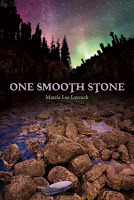 Desperate to escape his past, the police, and especially, God, Alex Donnelly picks a good place to hide - the Yukon wilderness - but he finds even there his is pursued. What will it take for him to discover that no matter how far you run, God will find you, and no matter what you have done, God will forgive you?
Desperate to escape his past, the police, and especially, God, Alex Donnelly picks a good place to hide - the Yukon wilderness - but he finds even there his is pursued. What will it take for him to discover that no matter how far you run, God will find you, and no matter what you have done, God will forgive you?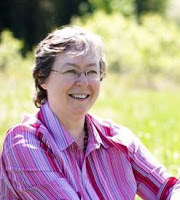 Marcia Lee Laycock writes from central Alberta Canada where she is a pastor's wife and mother of three adult daughters. She was the winner of The Best New Canadian Christian Author Award for her novel, One Smooth Stone. The sequel, A Tumbled Stone was short listed in The Word Awards. Marcia also has four devotional books in print and has contributed to several anthologies. Her work has been endorsed by Sigmund Brouwer, Janette Oke, Phil Callaway and Mark Buchanan.
Marcia Lee Laycock writes from central Alberta Canada where she is a pastor's wife and mother of three adult daughters. She was the winner of The Best New Canadian Christian Author Award for her novel, One Smooth Stone. The sequel, A Tumbled Stone was short listed in The Word Awards. Marcia also has four devotional books in print and has contributed to several anthologies. Her work has been endorsed by Sigmund Brouwer, Janette Oke, Phil Callaway and Mark Buchanan.

Published on September 17, 2017 02:00
September 16, 2017
How to Write a Memorable Romance Scene
 by Michelle Griep, @MichelleGriep
by Michelle Griep, @MichelleGriepNobody wants to admit to reading romance novels. Those are for the trashy sort, the kind that hang out in laundromats, the losers with awkward social skills who don't have a hope of ever snagging their own happily-ever-after. Right?
Wrong-o bucko.
Besides that statement being politically incorrect and highly intolerant, it's also a huge misconception. In fact, romance novels are and have been some the hottest selling books flying off the shelves. So rest at ease if one of your guilty pleasures is snuggling up with a romantic tale. In fact, I just wrote a kissy-faced scene today and had to stop and think about the actual nuts and bolts of romance. And since I did all that brain work, thought I'd share . . .
Go for the ooh-la-la-la thrill of it all—but keep a leash on all that passion.
Let's get this one out of the way first, shall we? When people think romance, they think smoochy-smoochy-touchy-feely, all twangy in the tummy and fireworks sizzling along every nerve. Of course should include such descriptions if you want to reflect human beings, not robots, but don’t overdo it, especially if you’re writing for the inspirational market. Sprinkle in physical sensations like a pinch of salt, flavoring the scene with intimate vibes without crossing the line into explicit mind images.
The feeling of being cherished/wanted is mandatory.A really romantic scene plays on the deep need everyone has: that of being desired for who they are, not just for what they look like or what they do. True romance is being loved even for your warts and toenail fungus. Yeah, that's a tough kind of love to exhibit—but it's also a primal need in all of us.
There must be a hope of a secure future with this person.Romance isn't just about a one night stand. It's about feeling secure, a peace and a hope of a bright new dawn. There's a reason for the phrase happily ever after. It makes our hearts grab some pompoms and cheer.
Make use of an outer release for inner feelings that have been building.Think of this as the Christmas morning of all scenes. The culmination of what the reader's been waiting for. The tension that's been building inside the characters must be finally released in a tangible way. Your characters, the reader, and even you will heave a contented sigh.
Next time you're crafting a romantic scene, make sure to include all four of these elements. It will connect with the reader on a deeper level than just a simple kiss. It will connect with their heart.
TWEETABLES
How to Write a Memorable Romance Scene by @MichelleGriep on @NovelRocket #writing http://bit.ly/2yc5GNE
4 Elements to include when you're crafting a romantic scene by @MichelleGriep on @NovelRocket #writing http://bit.ly/2yc5GNE
Romance is about feeling a peace and a hope of a bright new dawn. @MichelleGriep on @NovelRocket #writing http://bit.ly/2yc5GNE
_____________________
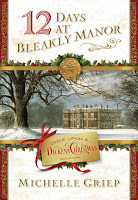
12 Days at Bleakly Manor
Imprisoned unjustly, BENJAMIN LANE wants nothing more than freedom and a second chance to claim the woman he loves—but how can CLARA CHAPMAN possibly believe in the man who stole her family’s fortune and abandoned her at the altar? Brought together under mysterious circumstances for the Twelve Days of Christmas, Clara and Ben discover that what they've been striving for isn't what ultimately matters . . . and what matters most is love.
 Author Michelle GriepMichelle Griep’s been writing since she first discovered blank wall space and Crayolas. She is the author of historical romances: The Innkeeper’s Daughter, 12 Days at Bleakly Manor, The Captive Heart, Brentwood’s Ward, A Heart Deceived, Undercurrent andGallimore, but also leaped the historical fence into the realm of contemporary with the zany romantic mystery Out of the Frying Pan. If you’d like to keep up with her escapades, find her at www.michellegriep.com or stalk her on Facebook, Twitter, or Pinterest.the next level.
Author Michelle GriepMichelle Griep’s been writing since she first discovered blank wall space and Crayolas. She is the author of historical romances: The Innkeeper’s Daughter, 12 Days at Bleakly Manor, The Captive Heart, Brentwood’s Ward, A Heart Deceived, Undercurrent andGallimore, but also leaped the historical fence into the realm of contemporary with the zany romantic mystery Out of the Frying Pan. If you’d like to keep up with her escapades, find her at www.michellegriep.com or stalk her on Facebook, Twitter, or Pinterest.the next level.

Published on September 16, 2017 02:00
September 15, 2017
Chasing the Muse
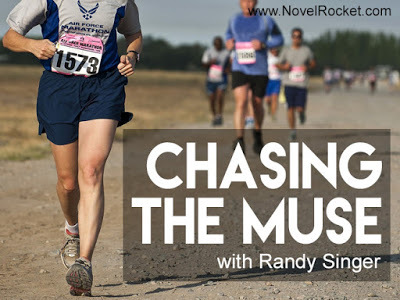 by Randy Singer, @litfuse
by Randy Singer, @litfuseIt dawned on me recently that I did not begin my writing career seventeen years ago when I started the manuscript for Directed Verdict, my first book. It actually began nearly ten years before that when, as a young attorney, I had fully developed plot lines kicking around in my head.
And it happened while I was running.
At the time, I was a young associate in the litigation section of a relatively large firm. I loved my job but it was a lot of hard work, grinding away on big cases, reviewing reams and reams of documents. It was a far cry from the exciting life of the television lawyers who get to try a major case every sixty minutes. To relieve stress, I would do a lot of running. And while I ran, I would think about my cases, or about other lawyer’s cases, or about hypothetical cases and how I would try them.
And so it was, that all of my big cases were tried not in inside a courtroom, but inside my head. While I ran, the real cases became more elaborate and the evidence developed just the way I wanted, with the other side’s primary witness crashing and burning under my cross-examination. In the fictional cases, I was still the hero, though sometimes I would lose at trial and have to pull it out on appeal. At the Supreme Court, of course.
Now, putting aside what this means in terms of a narcissistic disorder, I found it interesting that my best creative thinking took place while I was running. I was not only putting together entire plot lines for imaginary cases, but I would also generate some fairly creative ideas for my real ones.
Twenty-seven years later, I still have my most creative moments while running or while paddling my outrigger. Sermons get constructed (I am a pastor as well as a lawyer), cases get solved and plot twists get conceptualized. Many times I will come back sweating like crazy and jot down some notes on a wet piece of paper before I lose the thought. Sometimes, after I cool down, I realize the thoughts I had while running were a little too creative and wouldn’t actually work in the real world. But many times, the creative bursts from the run were just what I needed.
Turns out that there is physiological research to support this connection between the endorphins that we release while exercising and enhanced creativity.Here is a Psychology Today article written by Steven Kotler explaining the neurobiology of being in “flow”: Flow States and Creativity. The essence of it is that the endorphins shut down our inner critic (the dorsolateral prefrontal cortex, to be precise), allowing us to be more daring and creative, and change our brainwaves so we can “slip from thought to thought without internal resistance.” In the flow, we more easily combine novel information with old thoughts to create something spectacularly new.
I didn’t need Steve Kotler to tell me that it worked. Whenever I hit writer’s block, I would go for a run. When my sermon was not coming together, I would go out for a paddle. When a case is in transient, I might take a long walk. It didn’t always solve everything, but it always helped.
Maybe you don’t like to run. You can achieve the same benefits from walking. The key is to find something that you can do for at least thirty minutes to get your blood pumping but something that is not so strenuous that your mind can’t wander from the task at hand. And you need to do it alone. If your Cross-Training coach is chewing you out or your walking partner is chatting you up or your iTunes are blaring in your ears, this won’t work.
You must have time alone with your thoughts and your endorphins.
I’m actually a bit of a nut about this (as you can probably tell) and dictate large portions of my first draft while walking around the local golf course. Though this adds another step to the writing process, I find there is something about being outside and moving that brings an exponential increase in my productivity. Tip: take your phone along in case you need to do some quick research in the middle of a scene.
And have a pen and paper ready when you return from your run/bike/walk/paddle. The Muse is an athlete, and she makes a fabulous running partner.
TWEETABLESChasing the Muse by Randy Singer on @NovelRocket @litfuse #writing http://bit.ly/2yalnEX
How can exercise encourage creativity & impact your writing Find out from Randy Singer @NovelRocket @litfuse http://bit.ly/2yalnEX
The Muse is an athlete, and she makes a fabulous running partner. @NovelRocket @litfuse #writing http://bit.ly/2yalnEX
____________________
Rule of Law by Randy Singer
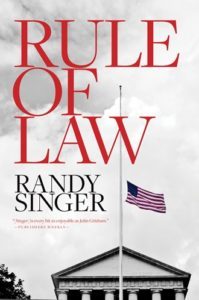 What did the president know? And when did she know it?
What did the president know? And when did she know it?For the members of SEAL Team Six, it was a rare mission ordered by the president, monitored in real time from the Situation Room. The Houthi rebels in Yemen had captured an American journalist and a member of the Saudi royal family. Their executions were scheduled for Easter Sunday. The SEAL team would break them out.
But when the mission results in spectacular failure, the finger-pointing goes all the way to the top.
Did the president play political games with the lives of U.S. service members?
Paige Chambers, a determined young lawyer, has a very personal reason for wanting to know the answer. The case she files will polarize the nation and test the resiliency of the Constitution. The stakes are huge, the alliances shaky, and she will be left to wonder if the saying on the Supreme Court building still holds true.
Equal justice under law.
It makes a nice motto. But will it work when one of the most powerful people on the planet is also a defendant?
 Randy Singer is a critically acclaimed author and veteran trial attorney. He has penned more than 10 legal thrillers, including his Christy award-winning debut novel, Directed Verdict,and ECPA’s 2015 Christian Book Award winner for fiction, The Advocate. He was also named a finalist, along with John Grisham and Michael Connelly, for the inaugural Harper Lee Prize for Legal Fiction sponsored by the American Bar Association and the University of Alabama Law School. In addition to his law practice and writing, Randy serves as a teaching pastor for Trinity Church in Virginia Beach, Virginia. He calls it his “Jekyll and Hyde thing” — part lawyer, part pastor. He also serves as Attorney in Residence and Director of the Singer Civil Litigation Practicum at Regent Law School.
Randy Singer is a critically acclaimed author and veteran trial attorney. He has penned more than 10 legal thrillers, including his Christy award-winning debut novel, Directed Verdict,and ECPA’s 2015 Christian Book Award winner for fiction, The Advocate. He was also named a finalist, along with John Grisham and Michael Connelly, for the inaugural Harper Lee Prize for Legal Fiction sponsored by the American Bar Association and the University of Alabama Law School. In addition to his law practice and writing, Randy serves as a teaching pastor for Trinity Church in Virginia Beach, Virginia. He calls it his “Jekyll and Hyde thing” — part lawyer, part pastor. He also serves as Attorney in Residence and Director of the Singer Civil Litigation Practicum at Regent Law School.He and his wife, Rhonda, live in Virginia Beach. They have two adult children. Visit his website at www.randysinger.net.


Published on September 15, 2017 08:32
September 14, 2017
Never Miss An Opportunity for A Good Argument
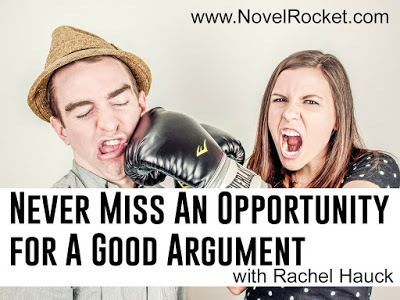
by Rachel Hauck, @RachelHauck
Zap-Pow! Then What Happened?
Tension is king.
Definition: Most of us hate conflict and confrontation. Even in our books. But tension is king! Donald Maass suggest tension on every page. Better yet, on every line.
Tension doesn’t mean argument. Tension means “things aren’t going well.”
For example: A conflict arises for your heroine. She gets pulled over for speeding. Instead of the officer letting her off, she gets a ticket. This upsets her. While she’s getting a ticket, her mother calls to say Uncle Ned is coming Sunday and our girl is expected at the house for dinner. She blows up. Why is Mama always so bossy? Our heroine will do what she wants for Sunday dinner. She might have plans already. Ever think of that, Mama?
Tension! Use every opportunity to create tension. To up the stakes. To distance the protagonist from her goal. Keep it real. Don’t have characters apologizing to other characters and relieving the tension.
Now, we do want those down moments when protagonist is exhaling, relaxing, laughing, doing well. Those are the sequel scenes where we see the protagonist advancing toward his or her ultimate goal.
Lets see this play out. Here is a scene where Jane found out John was moving to Peru to live in the jungle? What if she just accepts what he says and doesn’t fight back?
“W-what? You’re moving to Peru? I don’t understand.” Jane pressed her hands against her temple. John couldn’t be serious.
“I know it’s hard but I need to do this, Jane. I feel it is my way to salvation. I must deny myself.”
“Well, if you really feel it’s what you must do.” Jane crossed the room and embraced her fiancee. “I love you. I’ll miss you.”
What?! Nooooo, we want a fight here. You may think I’m being ridiculous, but I’ve read this in books before. Usually it’s because the author is trying to get rid of a character to bring in another one. What if John is not the true hero but Steve is? Either way, you must up the emotion. Jane doesn’t know about Steve yet. All she knows is she loves John and he’s talking crazy!
The scene would be more engaging with a tense conversation.
“W-what? You’re moving to Peru? To live in the jungle?” A sardonic laugh rolled up from Jane’s chest. “You don’t eve like to go on picnics. How are you going to live in the jungle?” She crossed her arms, regarding him, waiting for his answer. “I don’t believe it.”
“Well, believe it…” He snorted, dismissing her with a wave of his hand. “They said you’d react like this.”
“They who? John, you’re being brainwashed.” Jane fired across the room, gripping her fiancee by the shoulders. “Wake up. What has gotten into you?”
“The light, Jane.” He jerked out of her grasp. “I suggest you find a bit of the light in your own dark soul too.”
Much better right!? It’s so much more emotionally driven. Oh, John is going to leave and Steve is going to enter Jane’s life but until then, she’s in turmoil. Show that. Up the tension.
Rule: Never miss an opportunity for an argument.
Workshop it: What scene in your WIP needs more tension. Did you let the protagonist or another character off the hook?
TWEETABLES
Never Miss An Opportunity for A good Argument @RachelHauck on @NovelRocket #writing http://bit.ly/2w9SBXS
Use every opportunity to create tension. To up the stakes. @RachelHauck on @NovelRocket #writing http://bit.ly/2w9SBXS
Tension is king. @RachelHauck on @NovelRocket #writing http://bit.ly/2w9SBXS
______________________
 THE WRITING DESK
THE WRITING DESKTenley Roth’s first book was a runaway bestseller. Now that her second book is due, she’s locked in fear. Can she repeat her earlier success or is she a fraud who has run out of inspiration?
With pressure mounting from her publisher, Tenley is weighted with writer’s block. But when her estranged mother calls asking Tenley to help her through chemotherapy, she packs up for Florida where she meets handsome furniture designer Jonas Sullivan and discovers the story her heart’s been missing.
A century earlier, another woman wrote at the same desk with hopes and fears of her own. Born during the Gilded Age, Birdie Shehorn is the daughter of the old money Knickerbockers. Under the strict control of her mother, her every move is decided ahead of time, even whom she’ll marry. But Birdie has dreams she doesn’t know how to realize. She wants to tell stories, write novels, make an impact on the world. When she discovers her mother has taken extreme measures to manipulate her future, she must choose between submission and security or forging a brand new way all on her own.
Tenley and Birdie are from two very different worlds, but fate has bound them together in a way time cannot erase.
 New York Times, USA Today and Wall Street Journal best-selling, award-winning author Rachel Hauck loves a great story. She serves on the Executive Board for American Christian Fiction Writers. She is a past ACFW mentor of the year. A worship leader and Buckeye football fan, Rachel lives in Florida with her husband and ornery cat, Hepzibah. Read more about Rachel at www.rachelhauck.com.
New York Times, USA Today and Wall Street Journal best-selling, award-winning author Rachel Hauck loves a great story. She serves on the Executive Board for American Christian Fiction Writers. She is a past ACFW mentor of the year. A worship leader and Buckeye football fan, Rachel lives in Florida with her husband and ornery cat, Hepzibah. Read more about Rachel at www.rachelhauck.com.

Published on September 14, 2017 08:34
September 13, 2017
“Editing” Life
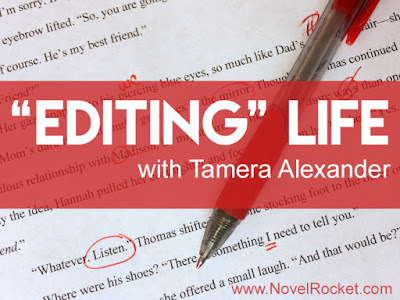 by Tamera Alexander, @tameraalexander
by Tamera Alexander, @tameraalexanderI'm currently heavy into writing the first full-length Carnton novel (title yet TBD). Each day when I begin writing, I reread what I’ve written the day before. It’s part of my routine. It helps me to get back into the flow of things, plus I have a pretty wicked editor inside me that I have a tough time shutting down.
I tweak here and there. Remove sentences. Move things around. Delete information that either the character—or perhaps the reader—ended up not needing to know at that point in the story.
Perhaps a paragraph slowed the pace or simply wasn’t crucial to the scene. So, it has to go. I move that portion of text to my Carnton 1 Excerpt file. (I’ve learned not to permanently delete it lest I find I do need it down the line.)
Wouldn’t it be wonderful if we could do that kind of editing with life?
Simply review life and decide, “Um, no. Let’s not do that there. Let’s move that here.” Or… “This event would be much better if I knew this first, then that happened.” Or “Doing it this way will fit much better with my schedule and will accommodatefill-in-the-blank much better then.” Then there’s the “Gracious! Let’s not let that happen at all!”
But as we all know, life doesn’t work that way.
Life simply comes. Sometimes in sputters, sometimes in a gentle flow, and sometimes in torrents. And we deal with things as they come with God’s strength. While, in His masterful grace, He helps us maintain our eternal perspective.
But you know, in the midst of everything––the highs and lows of life, the “troughs and peaks” as C.S. Lewis phrases it in The Screwtape Letters––it’s definitely the thinner times of life, the troughs, that draw me closer to God. That make me more dependent on the Holy Spirit. And that, frankly, make me more like Christ.
The Screwtape Letters is a “life book” for me. A forever book. Do you have those? Books you’ll read again and again? That have become a part of you? That you’ll carry with you into eternity?
Chapter 8 is a favorite. Back in college, I memorized most of that chapter (on troughs and peaks), and though my memory isn’t what it used to be (#understatement) the following portion of that chapter is still tucked inside me. Still resonates.
“Do not be deceived, Wormwood. Our cause is never more in danger than when a human, no longer desiring, but still intending, to do our Enemy's will, looks round upon a universe from which every trace of Him seems to have vanished, and asks why he has been forsaken, and still obeys.”― C.S. Lewis, The Screwtape Letters
My first copy of this book—held together by a rubber band now—is dear to me. Its words still instruct me after all these years. And more than ever, I firmly believe that nothing happens to a follower of Christ that doesn’t first filter through the loving hands of their Heavenly Father. Nothing.
 So, I’ll leave the “life editing” safely with the Master Storyteller. God writes with a point of view I simply do not—cannot—have. But it’s a point of view I trust implicitly—even when life is at its most difficult.
So, I’ll leave the “life editing” safely with the Master Storyteller. God writes with a point of view I simply do not—cannot—have. But it’s a point of view I trust implicitly—even when life is at its most difficult.What about you? Do you have “life books” (other than the Bible, of course) that you’ve read and reread? Are there certain passages from books that resonate long after? I'd love to know!
TWEETABLES
“Editing” Life by @tameraalexander on @NovelRocket #writing http://bit.ly/2gT3eaI
Wouldn’t it be wonderful if we could do that kind of editing with life? @tameraalexander on @NovelRocket #writing http://bit.ly/2gT3eaI
Do you have “life books” @tameraalexander on @NovelRocket #writing http://bit.ly/2gT3eaI______________________
To Wager Her Heart
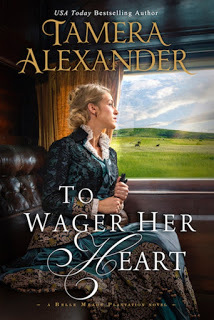 With fates bound by a shared tragedy, a reformed gambler from the Colorado Territory and a Southern Belle bent on breaking free from society's expectations must work together to achieve their dreams—provided the truth doesn't tear them apart first.
With fates bound by a shared tragedy, a reformed gambler from the Colorado Territory and a Southern Belle bent on breaking free from society's expectations must work together to achieve their dreams—provided the truth doesn't tear them apart first.Seeking justice . . .
Sylas Rutledge, the new owner of the Northeast Line Railroad, invests everything he has into this venture, partly for the sake of the challenge. But mostly to clear his father's name. One man holds the key to Sy's success—General William Giles Harding of Nashville's Belle Meade Plantation. But Harding is champagne and thoroughbreds, and Sy Rutledge is beer and bullocks. Sy needs someone to help him maneuver his way through Nashville's society, and when he meets Alexandra Jamison, he quickly decides he's found his tutor. Only, he soon discovers that the very train accident his father is blamed for causing is what killed Alexandra Jamison's fiancé—and has broken her heart.
Struggling to restore honor . . .
Spurning an arranged marriage by her father, Alexandra instead pursues her passion for teaching at Fisk University, the first freedmen's university in the United States. But family—and Nashville society—do not approve, and she soon finds herself cast out from both.
Through connections with the Harding family, Alexandra and Sy become unlikely allies. And despite her first impressions, Alexandra gradually finds herself coming to respect, and even care for this man. But how can she, when her heart is still spoken for? And when Sy's roguish qualities and adventuresome spirit smack more of recklessness than responsibility and honor?
Sylas Rutledge will risk everything to win over the woman he loves. What he doesn't count on is having to wager her heart to do it.
 Tamera Alexander is a USA Today bestselling novelist and one of today's most beloved authors of Christian historical romance. Her works have been awarded and nominated for numerous industry-leading honors, among them the Christy Award, the RITA Award, the Carol Award, Library Journal's top honors, and have earned the distinction of Publisher's Weekly Starred Reviews. Her deeply drawn characters and thought-provoking plots have earned her devoted readers worldwide.
Tamera Alexander is a USA Today bestselling novelist and one of today's most beloved authors of Christian historical romance. Her works have been awarded and nominated for numerous industry-leading honors, among them the Christy Award, the RITA Award, the Carol Award, Library Journal's top honors, and have earned the distinction of Publisher's Weekly Starred Reviews. Her deeply drawn characters and thought-provoking plots have earned her devoted readers worldwide. Tamera and her husband reside in Nashville, Tennessee, where they live a short distance from Nashville's Belmont Mansion and Belle Meade Plantation , the setting of Tamera’s #1 CBA bestselling Southern series. Her upcoming series, the Carnton Novels , launches in fall 2017 with Christmas at Carnton (October 3, 2017), a Christmas story, which is set at Franklin, Tennessee's historic Carnton Plantation.


Published on September 13, 2017 02:00
September 12, 2017
First Drafts
 by Katherine Reay, @Katherine_Reay
by Katherine Reay, @Katherine_ReayThe First Draft…
It’s wonderful to be here today. As I write this, The Austen Escape is a couple months from release and I begin a new story. In fact, this very morning, I pulled out my colored pens, opened the file in Scrivener and started, in earnest.
The blank page, or the blank computer screen, is a daunting sight. It’s exciting because it is just that – blank. We can fill it with anything and that anything has the potential to be great. But that catches our breath too because it must be filled – and that it will require hundreds of hours and thousands of words.
There a few things I try to remember as I begin each first draft:
Have fun. No editors are invited to the first ideas… My first pass at a scene or a chapter and even large sections of the “first” draft is a riff. I liken myself to the Zac Brown Band in concert – if you’ve had the absolute pleasure to see them. In the middle of a favorite song, often an eighties cover, they’ll go off on a musical tangent, loving every moment of their creative expression and taking us along for the ride. My first drafts aren’t quite that glorious – but they are unedited and often reveal unexpected nuggets that turn into the story’s gems later.
Side trails are allowed… I know where I want to go with my first draft. A general outline has been committed to the page, in colorful Sharpie pens. But the unexpected often happens during this first draft and this is the time to let it. Some of those sidetracks and winding trails can lead to character insights and tense moments you can’t anticipate – and they are the gems. When writing Dear Mr. Knightley, a small character named Kyle sidetracked me with his presence and his anger. He stole the story and my heart. Dear Mr. Knightley would be far less without Kyle.
Don’t be afraid to backtrack. For all I’ve said about no editing and following those trails, there may come a moment you get lost. Happens to me all the time. Put word count aside for a day, or a week, and go back to the beginning to reacquaint yourself with your original vision. You may find it has changed or it stays true. Either way, this “grounding” moment will allow you to see the story beneath story – and that’s the one you are really telling. That’s the one full of conflict, micro-tension and intrigue. Much of which you may not have outlined and yet now it jumps off the page and invites you fill dig further. If you do add characters or elements – once again, don’t let the inner editor into this new stuff, not yet.
Keep a notebook. As you start immersing yourself creatively in your first draft, you find characters speak to you at all times of the days – scenes pop up at the grocery store, twists and turns happen in the shower. Have a notebook nearby to capture them.
That’s all – because I’ve also learned, the fewer things one needs to remember, the better.
So I’ll begin a new first draft today… Daunting as it is, it is one of my favorite moments. I always hope to dump all heart and humor in this time, knowing I will tweak, edit, add, subtract, twist, turn or (yes) possibly obliterate it all later. But, without doubt, this is the moment to let loose and revel in the joy that is writing.
Please let me know if any of these were helpful – and also if you have tips for me. You can reach me on my website www.katherinereay.com, on Facebook at www.facebook.com/katherinereaybooks and on Twitter @katherine_reay.
TWEETABLES
First Drafts @Katherine_Reay on @NovelRocket #writing http://bit.ly/2vMu9aP
Four things I try to remember as I begin each first draft @Katherine_Reay on @NovelRocket #writing http://bit.ly/2vMu9aP
Daunting as it is, beginning a first draft is one of my favorite moments @Katherine_Reay on @NovelRocket #writing http://bit.ly/2vMu9aP
_____________________
Here’s a little peek into a final draft, releasing November 7th:
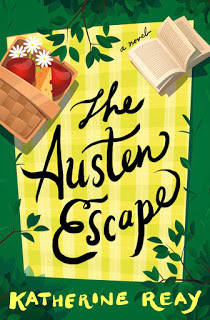 The Austen Escape.
The Austen Escape. Mary Davies finds safety in her ordered and productive life. Working as an engineer, she genuinely enjoys her job and her colleagues – particularly a certain adorable and intelligent consultant. But something is missing. When Mary’s estranged childhood friend, Isabel Dwyer offers her a two-week stay in a gorgeous manor house in England, she reluctantly agrees in hopes that the holiday will shake up her quiet life in just the right ways.
But Mary gets more than she bargained for when Isabel loses her memory and fully believes she lives in Jane Austen’s Bath. While Isabel rests and delights in the leisure of a Regency lady, attended by other costume-clad guests, Mary uncovers startling truths about their shared past, who Isabel was, who she seems to be, and the man who now stands between them.
Outings are undertaken, misunderstandings play out, and dancing ensues as this company of clever, well-informed people, who have a great deal of conversation, work out their lives and hearts.
 Katherine Reay is the award-winning author of Dear Mr. Knightley, Lizzy & Jane and The Bronte Plot, an ALA Notable Book Award Finalist. Her latest novel, A Portrait of Emily Price, released in November 2016 and received Starred Reviews from Publishers Weekly, Library Journal and a Romantic Times TOP PICK!All Katherine’s novels are contemporary stories with a bit of classical flair. She holds a BA and MS from Northwestern University and is a wife, mother, rehabbing runner, former marketer, and avid chocolate consumer. After living all across the country and a few stops in Europe, Katherine now happily resides outside Chicago, IL.
Katherine Reay is the award-winning author of Dear Mr. Knightley, Lizzy & Jane and The Bronte Plot, an ALA Notable Book Award Finalist. Her latest novel, A Portrait of Emily Price, released in November 2016 and received Starred Reviews from Publishers Weekly, Library Journal and a Romantic Times TOP PICK!All Katherine’s novels are contemporary stories with a bit of classical flair. She holds a BA and MS from Northwestern University and is a wife, mother, rehabbing runner, former marketer, and avid chocolate consumer. After living all across the country and a few stops in Europe, Katherine now happily resides outside Chicago, IL.

Published on September 12, 2017 02:00
September 11, 2017
4 Questions to Ask Yourself After You Write a Scene
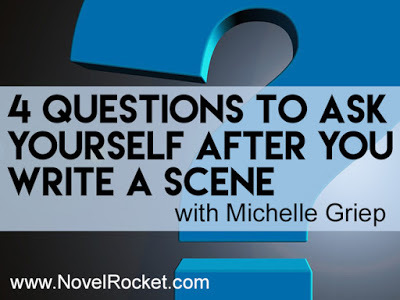 By Michelle Griep, @MichelleGriep
By Michelle Griep, @MichelleGriepJust because you've written a scene doesn't mean you can pack away your computer and grab yourself a brewskie. Guess what, little writer? Your work is NOT done. There are some questions you need to ask yourself after each and every scene you write . . .
1. What was the conflict in this scene? Were the stakes dire enough?
If you can't identify a conflict in your scene, delete it. Yeah, that's harsh, but cut the fat and get to the lean mean story. No one wants to read about characters who don't have problems. Readers want to punch those kinds of characters in the head.
2. Was your point-of-view character a force to be reckoned with or was he a piece of day-old toast?
If your character doesn't grab your reader by the throat and shake him around a bit, then he's meh. And you know what a meh character is? Death to the book. Spice it up, folks. Make your character interesting and active, someone who forces the plot to move forward, not the other way around.
3. Why did you care about this scene as an author? Or were you bored with it? Why?
If the scene you just wrote doesn't interest you, it won't interest the reader. If this is the case, go back and lob a hand grenade into the scene. Throw in a unicorn. Rip out the heroine's heart and stomp on it. Do something that makes you (and the reader) care about the scene.
4. What will happen tomorrow when you sit back down to write? Where will the story go? And what will happen if the story doesn't go that way?
Sure, it's great to map out your story so you have a general guideline to follow. It's also great to know what you're planning to write next time you sit down. But now and then, go for uber great by mixing the plot up a bit. Take it in a direction you never intended for it to go. You don't have to keep what you write, but more than likely you will because it will excite you about a new direction.
I’m not going to lie . . . going through these questions each and every time you finish a scene is time consuming. In the long run, though, it will be worth it.
TWEETABLES
4 Questions to Ask Yourself After You Write a Scene by @MichelleGriep on @NovelRocket #writing http://bit.ly/2eNDUid
Questions you need to ask yourself after each and every scene you write @MichelleGriep on @NovelRocket #writing http://bit.ly/2eNDUid
Cut the fat and get to the lean mean story. @MichelleGriep on @NovelRocket #writing http://bit.ly/2eNDUid
____________________

12 Days at Bleakly Manor
Imprisoned unjustly, BENJAMIN LANE wants nothing more than freedom and a second chance to claim the woman he loves—but how can CLARA CHAPMAN possibly believe in the man who stole her family’s fortune and abandoned her at the altar? Brought together under mysterious circumstances for the Twelve Days of Christmas, Clara and Ben discover that what they've been striving for isn't what ultimately matters . . . and what matters most is love.
 Author Michelle GriepMichelle Griep’s been writing since she first discovered blank wall space and Crayolas. She is the author of historical romances: The Innkeeper’s Daughter, 12 Days at Bleakly Manor, The Captive Heart, Brentwood’s Ward, A Heart Deceived, Undercurrent andGallimore, but also leaped the historical fence into the realm of contemporary with the zany romantic mystery Out of the Frying Pan. If you’d like to keep up with her escapades, find her at www.michellegriep.com or stalk her on Facebook, Twitter, or Pinterest.the next level.
Author Michelle GriepMichelle Griep’s been writing since she first discovered blank wall space and Crayolas. She is the author of historical romances: The Innkeeper’s Daughter, 12 Days at Bleakly Manor, The Captive Heart, Brentwood’s Ward, A Heart Deceived, Undercurrent andGallimore, but also leaped the historical fence into the realm of contemporary with the zany romantic mystery Out of the Frying Pan. If you’d like to keep up with her escapades, find her at www.michellegriep.com or stalk her on Facebook, Twitter, or Pinterest.the next level.

Published on September 11, 2017 02:00
September 10, 2017
Act 2 Plotting in 5 Easy Questions
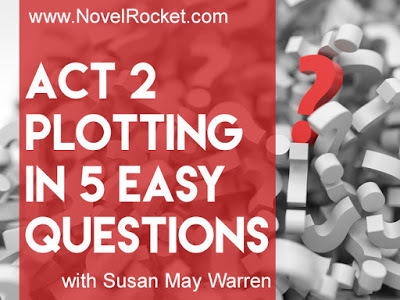 by Susan May Warren, @SusanMayWarren
by Susan May Warren, @SusanMayWarren I always get the Chapter Seven Blues. I know it’s inevitable, but I seem to forget that it happens, and often I’ll find myself down in the kitchen, moping (and looking for chocolate) and my husband will say… “You’re at Chapter 7, aren’t you?”
I’ll turn, stare at him, and nod. “How did you know that?”
“Because the excitement of the story has gotten you through chapter 3, and Act 1, and the momentum carried you into chapters 4-6, but now the steam has died in the middle of Act 2, and you’re down here hunting for inspiration.” (This is usually accompanied by him taking the bag of chocolate chips out of my hand.)
He’s dead right. I’m smack in the middle of the long highway weaving through Act 2, and it’s been a LOOOONG time since I’ve seen a road sign.
That’s when I trudge back to my office and pull out my plotting roadmap. It’s not long after that I’m pedal to the metal down the highway, headed to Act 3. All I needed was a little direction. And that’s where my Act 2 plotting helped save the day.
The truth is, most writers lose their steam in Act 2. But it’s really just a matter of knowing where your character is going, and the stepping stones to getting him there.
Act 2 is comprised of 4 major steps and 5 easy questions.
Step 1: Attempt (and failure) – This happens early in Act 2, when your characters motivation and enthusiasm for victory are high. They can conquer the world! Except they don’t. It’s imperative that they fail on some level (even if they have a win of some sort), because it injects conflict and a fear of failure into the story. Without this, there’s no contest. If winning is sure thing, then the story is boring. (like when a basketball team wins 87 to 14. Yuck).
Ask: What can I have my character fail at that makes him doubt himself or victory?
After the Attempt (and failure), your character must consider three things:
The Cost: What it might cost him to go on this journey – what he might lose.
The Rewards: What prize awaits him ?
Desire: Why does he want to do this? (and this desire must be greater or equal than the cost!)
*All of these should add up to enough motivation to continue the journey.
Step 2: Training for Battle – This is the “fun and games” or the bulk of the story. Here is wherey your character changes and grows as a person.
Ask: What steps will your character take to win the day? (break your plotting down to smaller steps – it will help you construct your scenes).
However, sadly, the way we grow is often through struggle. So, you’re going to have to put your character through his paces. You’ll do this by causing conflict at each step. (Note: Sometimes, something GOOD happens…but it still causes conflict. Like rescuing the heroine might ignite all of Troy to assemble on your beach!)
The key is…after the conflict, your character must make a decision about what to do next. It’s this decision that both continues his journey and causes him to change and grow. (I call this decision the Y in the Road).
I’ve gone round and round on terms for these, and my last Deep Thinker’s group settled on these: (yes, I know it’s bad grammar, but it works!)
Bad+ Y in the Road
Badder + Y in the Road
Baddest Y in the Road
Ask: What conflict will I cause for my character, and how will his/her decision after this cause him/her to grow?
Step 3: Attempt (and mini-victory) – Your character has to have some taste of victory, or he/she will simply give up. If you feel your character needs this victory during the Training for Battle stage…make it happen! These are simply roadmarkers, but they can be moved around. The key is to always remember to keep enough motivation for every decision your character makes. However, I like to put this right before the Black Moment, to remind him of what he has to fight for.
Ask: How can I give my character a taste of Victory, or HEA?
Step 4: The Black Moment Event! – We’ve already plotting this event when we did our Dark Moment plotting and discovered our character’s Greatest Fear. The confirmation of the Lie and the Epiphany come at the beginning of Act 3, with the Black Moment Effect.
But, as a review, ask: What is my character’s great fear, and how will I make this happen?
Some people ask WHY do we have to have a Black Moment. That’s a much longer post, but the short of it is – it is only after our Black Moments that we truly experience deep change. (And, it makes for a fabulous story.)
To help, I’ve created a little Plotting Roadmarker Chart for Act 2: Quick Skills Plotting Diagram
Quick Skill: Plot the Roadmarkers of Act 2 before you start on your journey. You can always change it later as you get into the story, but this way, hopefully you won’t find yourself lost in the wasteland of Chapter 7, singing the blues.
Happy Writing!
Susie May
TWEETABLES
Act 2 Plotting in 5 Easy Questions @SusanMayWarren on @NovelRocket #writing http://bit.ly/2vML8cV
Chapter Seven Blues @SusanMayWarren on @NovelRocket #writing http://bit.ly/2vML8cVPlot the Roadmarkers of Act 2 before you start on your journey. @SusanMayWarren on @NovelRocket #writing http://bit.ly/2vML8cV
_____________________
A Matter of Trust (Montana Rescue Book #3)
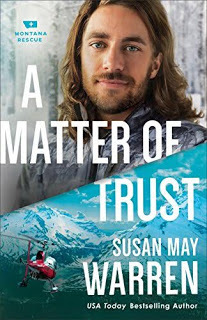 Champion backcountry snowboarder Gage Watson has left the limelight behind after the death of one of his fans. After being sued for negligence and stripped of his sponsorships, he's remade his life as a ski patrol in Montana's rugged mountains, as well as serving on the PEAK Rescue team. But he can't seem to find his footing--or forget the woman he loved, who betrayed him.
Champion backcountry snowboarder Gage Watson has left the limelight behind after the death of one of his fans. After being sued for negligence and stripped of his sponsorships, he's remade his life as a ski patrol in Montana's rugged mountains, as well as serving on the PEAK Rescue team. But he can't seem to find his footing--or forget the woman he loved, who betrayed him.Senator and former attorney Ella Blair spends much of her time in the limelight as the second-youngest senator in the country. But she has a secret--one that cost Gage his career. More than anything, she wants to atone for her betrayal of him in the courtroom and find a way to help him put his career back on track.
When Ella's brother goes missing on one of Glacier National Park's most dangerous peaks, Gage and his team are called in for the rescue. But Gage isn't so sure he wants to help the woman who destroyed his life. More, when she insists on joining the search, he'll have to keep her safe while finding her reckless brother, a recipe for disaster when a snowstorm hits the mountain.
But old sparks relight as they search for the missing snowboarder--and suddenly, they are faced with emotions neither can deny. But when Ella's secret is revealed, can they learn to trust each other--even when disaster happens again?
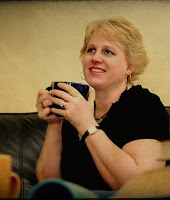 Susan May Warren is owner of Novel Rocket and the founder of Novel.Academy. A Christy and RITA award-winning author of over fifty novels with Tyndale, Barbour,
Susan May Warren is owner of Novel Rocket and the founder of Novel.Academy. A Christy and RITA award-winning author of over fifty novels with Tyndale, Barbour, 

Published on September 10, 2017 02:00



